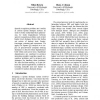Free Online Productivity Tools
i2Speak
i2Symbol
i2OCR
iTex2Img
iWeb2Print
iWeb2Shot
i2Type
iPdf2Split
iPdf2Merge
i2Bopomofo
i2Arabic
i2Style
i2Image
i2PDF
iLatex2Rtf
Sci2ools
ACL
2006
2006
Dependencies between Student State and Speech Recognition Problems in Spoken Tutoring Dialogues
Speech recognition problems are a reality in current spoken dialogue systems. In order to better understand these phenomena, we study dependencies between speech recognition problems and several higher level dialogue factors that define our notion of student state: frustration/anger, certainty and correctness. We apply Chi Square (2) analysis to a corpus of speech-based computer tutoring dialogues to discover these dependencies both within and across turns. Significant dependencies are combined to produce interesting insights regarding speech recognition problems and to propose new strategies for handling these problems. We also find that tutoring, as a new domain for speech applications, exhibits interesting tradeoffs and new factors to consider for spoken dialogue design.
| Added | 30 Oct 2010 |
| Updated | 30 Oct 2010 |
| Type | Conference |
| Year | 2006 |
| Where | ACL |
| Authors | Mihai Rotaru, Diane J. Litman |
Comments (0)

